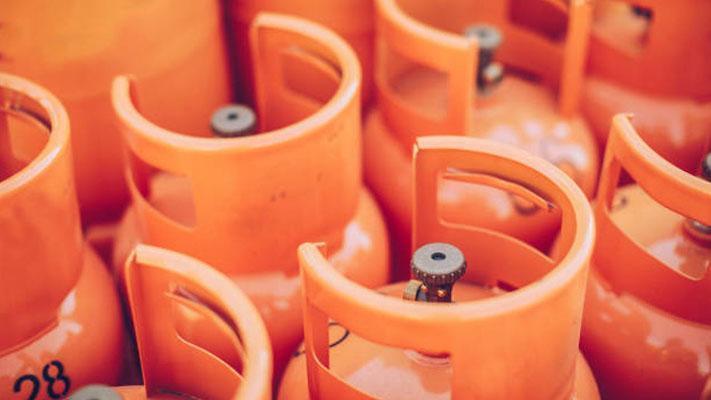Nigerians Groan as Cooking Gas Price Hits ₦1,800 Per Kilogram Amid Shortage.
The cost of Liquefied Petroleum Gas (LPG), commonly known as cooking gas, has surged sharply across several Nigerian cities, including Lagos, Ogun, and Ibadan, following a nationwide shortage.
The scarcity was triggered by a three-day strike by oil workers, which disrupted gas supply and distribution across the country. Prices have also spiked in other states such as Port Harcourt, Cross River, Kano, and Kaduna.
The Petroleum and Natural Gas Senior Staff Association of Nigeria (PENGASSAN) had embarked on the strike last week to protest the dismissal of some workers at the Dangote Refinery. Although the strike has since been suspended, the brief disruption in supply caused many gas depots to run dry, leading to rationing and steep price hikes.
In many parts of the country, the price of cooking gas has jumped from around ₦1,000 per kilogram to between ₦1,600 and ₦1,800.
In Abuja, refilling a 12.5kg cylinder now costs between ₦17,000 and ₦18,750, depending on the location. In districts such as Wuse, Garki, and Kubwa, a kilogram of LPG sells for ₦1,350 to ₦1,500, while some outlets in Jabi offer a 12.5kg refill for about ₦17,000.
Retailers in the city report that many outlets ran out of stock by Sunday, while those still selling gas increased their prices significantly.
A similar situation is unfolding in Lagos and Ogun States, where the price per kilogram rose from about ₦1,000 and ₦1,100 respectively last week to between ₦1,300 and ₦1,800 over the weekend.
Across Nigeria, households and small businesses continue to feel the impact of the gas shortage, as prices soar daily with no immediate relief in sight.
The cost of Liquefied Petroleum Gas (LPG), commonly known as cooking gas, has surged sharply across several Nigerian cities, including Lagos, Ogun, and Ibadan, following a nationwide shortage.
The scarcity was triggered by a three-day strike by oil workers, which disrupted gas supply and distribution across the country. Prices have also spiked in other states such as Port Harcourt, Cross River, Kano, and Kaduna.
The Petroleum and Natural Gas Senior Staff Association of Nigeria (PENGASSAN) had embarked on the strike last week to protest the dismissal of some workers at the Dangote Refinery. Although the strike has since been suspended, the brief disruption in supply caused many gas depots to run dry, leading to rationing and steep price hikes.
In many parts of the country, the price of cooking gas has jumped from around ₦1,000 per kilogram to between ₦1,600 and ₦1,800.
In Abuja, refilling a 12.5kg cylinder now costs between ₦17,000 and ₦18,750, depending on the location. In districts such as Wuse, Garki, and Kubwa, a kilogram of LPG sells for ₦1,350 to ₦1,500, while some outlets in Jabi offer a 12.5kg refill for about ₦17,000.
Retailers in the city report that many outlets ran out of stock by Sunday, while those still selling gas increased their prices significantly.
A similar situation is unfolding in Lagos and Ogun States, where the price per kilogram rose from about ₦1,000 and ₦1,100 respectively last week to between ₦1,300 and ₦1,800 over the weekend.
Across Nigeria, households and small businesses continue to feel the impact of the gas shortage, as prices soar daily with no immediate relief in sight.
Nigerians Groan as Cooking Gas Price Hits ₦1,800 Per Kilogram Amid Shortage.
The cost of Liquefied Petroleum Gas (LPG), commonly known as cooking gas, has surged sharply across several Nigerian cities, including Lagos, Ogun, and Ibadan, following a nationwide shortage.
The scarcity was triggered by a three-day strike by oil workers, which disrupted gas supply and distribution across the country. Prices have also spiked in other states such as Port Harcourt, Cross River, Kano, and Kaduna.
The Petroleum and Natural Gas Senior Staff Association of Nigeria (PENGASSAN) had embarked on the strike last week to protest the dismissal of some workers at the Dangote Refinery. Although the strike has since been suspended, the brief disruption in supply caused many gas depots to run dry, leading to rationing and steep price hikes.
In many parts of the country, the price of cooking gas has jumped from around ₦1,000 per kilogram to between ₦1,600 and ₦1,800.
In Abuja, refilling a 12.5kg cylinder now costs between ₦17,000 and ₦18,750, depending on the location. In districts such as Wuse, Garki, and Kubwa, a kilogram of LPG sells for ₦1,350 to ₦1,500, while some outlets in Jabi offer a 12.5kg refill for about ₦17,000.
Retailers in the city report that many outlets ran out of stock by Sunday, while those still selling gas increased their prices significantly.
A similar situation is unfolding in Lagos and Ogun States, where the price per kilogram rose from about ₦1,000 and ₦1,100 respectively last week to between ₦1,300 and ₦1,800 over the weekend.
Across Nigeria, households and small businesses continue to feel the impact of the gas shortage, as prices soar daily with no immediate relief in sight.
0 Comments
·0 Shares
·557 Views




